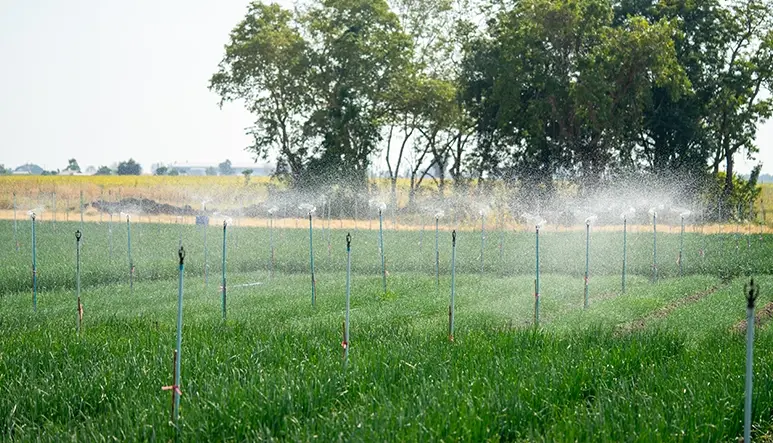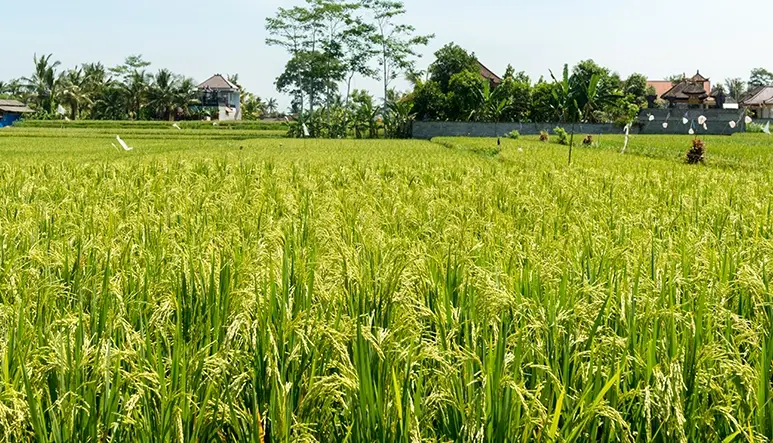Irrigation Techniques for Quality Rice Production

June 15th, 2023
Water is a critical factor in rice farming, and employing proper irrigation techniques is vital for achieving optimal production and yield. Efficient irrigation ensures that rice plants receive the right amount of water at the right time, promoting healthy growth and development. Sponge is one of the leading rice producers in this country, and for a reason! We make sure to undertake the best farming practices and implement the most efficient irrigation techniques for optimal rice production. In this blog post, we will explore various irrigation techniques that farmers can employ to maximise rice production. By understanding and implementing these techniques effectively, farmers can enhance water efficiency, minimise water-related stress, and ultimately increase the productivity of their rice fields. Flood irrigation is the most traditional and widely used technique in rice farming. It involves flooding the field with water and maintaining a consistent water level throughout the crop growth cycle. This technique allows rice plants to grow in a submerged environment, which helps control weeds and provides a favourable condition for nutrient uptake. Integrating keywords naturally: flood irrigation in rice farming, submerged rice cultivation, weed control in flooded fields. AWD is an innovative irrigation technique that can significantly reduce water usage while maintaining rice yield. This method involves alternating wetting and drying cycles in the field. Instead of continuously flooded conditions, the water level is periodically lowered to allow the soil to partially dry before re-irrigating. AWD helps conserve water, improves nutrient use efficiency, and reduces methane emissions from paddy fields. Integrating keywords naturally: AWD irrigation in rice farming, water-saving techniques, nutrient use efficiency. Sprinkler irrigation is a versatile technique that can be used in rice farming, particularly in areas with limited water resources. It involves distributing water through sprinklers that spray water over the field. This method ensures uniform water distribution and reduces water wastage through evaporation and runoff. Sprinkler irrigation is beneficial in controlling diseases related to excessive moisture, such as blast or bacterial leaf blight. Integrating keywords naturally: sprinkler irrigation for rice, water-efficient irrigation, disease control in sprinkler-irrigated rice. Drip irrigation is a precise and efficient method that delivers water directly to the plant roots through a network of tubes and emitters. Although not commonly used in large-scale rice farming, drip irrigation can be suitable for rice cultivation in areas where water scarcity is a significant concern. Drip irrigation reduces water consumption and allows farmers to apply water and nutrients precisely, minimising leaching and increasing resource-use efficiency. Integrating keywords naturally: drip irrigation in rice farming, water-saving technologies, precision irrigation for rice. Regardless of the irrigation technique chosen, proper scheduling and monitoring are crucial for effective water management. Farmers should consider factors such as soil moisture levels, weather conditions, crop growth stage, and water availability when determining the irrigation schedule. Regular monitoring of soil moisture using sensors or visual inspection helps farmers adjust irrigation practices accordingly. Integrating keywords naturally: irrigation scheduling for rice, water management in rice farming, soil moisture monitoring techniques. Implementing appropriate irrigation techniques is essential for optimising rice production. By adopting flood irrigation, alternate wetting and drying (AWD), sprinkler irrigation, or drip irrigation, farmers can ensure efficient water use, reduce water-related stress, and enhance the overall productivity of their rice fields. Selecting the most suitable technique depends on factors such as water availability, environmental conditions, and farm size. Remember to consider irrigation scheduling and monitor soil moisture levels to fine-tune the irrigation practices and maximise water-use efficiency. That said, Sponge is one of the best producers of rice in this industry because we take care in all the stages of this process. Get in touch with our experts to know more!Irrigation Techniques for Quality Rice Production
Flood Irrigation
Alternate Wetting and Drying (AWD)
Sprinkler Irrigation
Drip Irrigation
Scheduling and Monitoring
Conclusion


